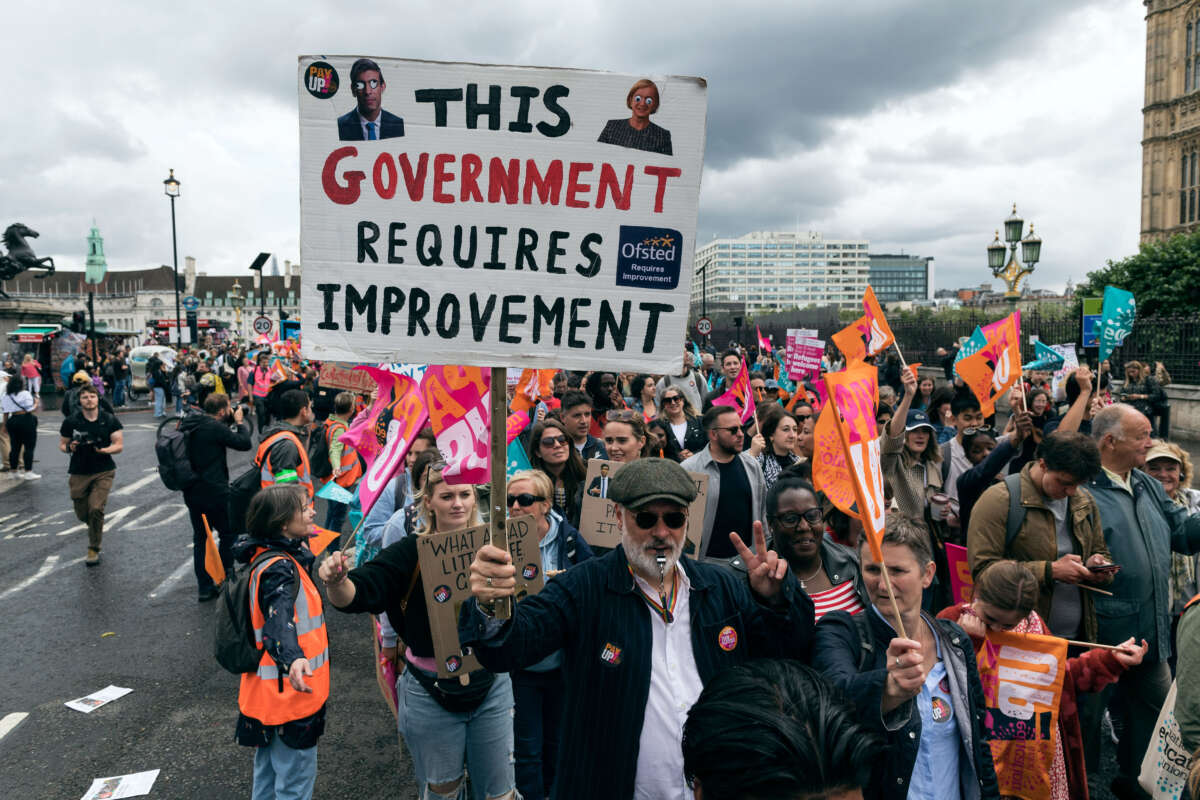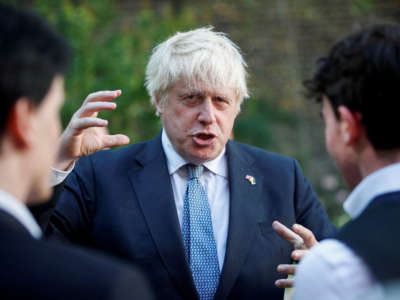Recent polls show the British public trusts the Labour Party will handle the economy better than the Conservatives have.By Sasha Abramsky ,

Support justice-driven, accurate and transparent news — make a quick donation to Truthout today!
Later this week, the ruling U.K. Conservative Party faces three by-elections for parliamentary seats left vacant by resignations. One of them is disgraced ex-Prime Minister Boris Johnson’s west London seat; another is an ultra-safe Conservative seat in northern England; and the third is a safe Conservative seat in the south of the country. If the polls are to be believed, the party is in danger of losing all three seats, two to Labour candidates, one to the Liberal-Democrats.
After 13 years in power, the disastrous, fracturing impact of Brexit, the inept response to COVID, the sleaze and corruption of the Johnson premiership, the stunning ineptitude of short-lived Prime Minister Liz Truss, and accumulating economic woes, the Conservatives give every indication of being a government in terminal decline.
That sense of the country being ready for something — anything — different from the failed status quo is playing out in the by-elections.
It is also unfolding in the workplace. For the second year in a row, the U.K. is facing a series of strikes, most of them involving public sector workers denouncing the Conservative government’s long-standing underinvestments in vital public services. The strikes have widespread public sympathy, and the unions — which historically have backed the Labour Party — have, despite the hostility of Britain’s mainly conservative tabloid press, largely managed to control the popular narrative on why the strikes are occurring.
RELATED STORY

Britain’s Economic Unraveling May Be Boris Johnson’s Real Legacy
The combination of Brexit, the aftereffects of COVID-19 and the war in Ukraine has left the British economy weak.By Sasha Abramsky , TRUTHOUT
August 16, 2022
Last week, junior doctors in the U.K. began a five-day strike against appallingly long hours and low pay. Young medics could be seen on the picket line outside National Health Service (NHS) facilities, holding up placards denouncing salaries that they say translate to £14 (or about $18) per hour, less than what many fast food workers make in the U.S., certainly less than what many wait staff earn in a high-wage locale such as California. Even with overtime, starting salaries for the U.K.’s doctors range from between £30,000 to £40,000 per year.
The doctors have asked for a 35 percent pay increase, to account for years in which they received no increases, even as the pandemic-triggered inflationary spiral ate away at the value of their salaries. The government has countered with a final offer of 6 percent — which doesn’t even begin to keep up with current inflation rates (the U.K.’s inflation rate peaked above that of the U.S. and the EU, and it is taking longer to taper off again; it is still more than 7 percent). In such an inflationary environment, the government’s pay offer is, quite simply, an insult.
Not surprisingly, the unions representing NHS staff are unimpressed, and the strikes are likely to continue. This week, consultants — the most senior doctors in the NHS — are also scheduled to strike. They too argue that, since 2008, their salaries have declined by more than a third in real terms. And they point out that faced with stunningly low pay, thousands of British doctors are now joining a post-Brexit brain drain, leaving for countries such as Australia and New Zealand that accept U.K. medical credentials and offer more competitive salaries. It’s a simply unsustainable situation for a health system that used to be the envy of the world but that now has wait lists of months and even years for basic services.
The Brexit-era economy that Johnson helped usher in is an inflationary mess. And the country is, in consequence, beset by strikes across the public sector.
Doctors aren’t the only ones who have reached for industrial action. In recent months, nurses have also hit the picket lines, going on strike for the first time in the more than 100-year history of the nurse’s union. Ambulance drivers have walked off the job. Radiographers have voted to strike.
Outside of the medical professions, teachers have struck for better pay. The railways have also been rocked by a series of strikes. Last year, public defenders voted for strike action. Later this month, hundreds of airport workers in Gatwick, London’s second airport, will strike — the latest in a series of airport actions in the U.K. over the past two years. And the list goes on. So pervasive are the strikes that people now routinely consult industrial action schedules before they try to plan out their days.
The U.K. hasn’t seen this level of industrial action in decades. In the late 1970s, during the so-called “winter of discontent,” the resultant outcry over the government’s inability to grapple with deep-rooted economic problems resulted in the ouster of the Labour government and the coming to power of Margaret Thatcher and her hardline Conservative cabinet. This time around, it’s likely to result in the governing Conservatives being kicked to the curb at the next election.
That election doesn’t have to be scheduled until early 2025, but the smart money is on the government calling an election for the spring of 2024. The assumption is that things won’t get better for the Tories in the interim, and therefore an early election might slightly limit the electoral carnage, whereas pushing the election out to the holiday season of 2024/25 will likely only further antagonize the increasingly angry electorate.
Already, numerous Conservative members of parliament (MPs) are jumping ship, readying their CVs and making overtures to the private sector. So far, more than 40 have announced they won’t run for reelection. If the three by-elections on Thursday go the way the polls suggest, there will likely be even more of a stampede for the exits.
For months now, the Labour Party, led by Keir Starmer, has enjoyed a more than 20-point lead in the opinion polls. And while historically the Conservative Party has always scored strongest on how it handles the economy, these days Brits tell pollsters they trust Labour over the Conservatives on the economy, and Starmer over Prime Minister Rishi Sunak when it comes to economic competency. Senior Conservatives, albeit quoted anonymously, routinely tell journalists that the party is heading for a “massive” electoral defeat.
In late 2019, Boris Johnson secured what was deemed at the time to be a historic electoral win, breaking down Labour’s so-called “red wall” in working-class communities of northern England and securing for the Conservatives an 80-seat parliamentary majority. How long four years is in politics. In 2023, Johnson is disgraced and no longer a sitting MP. His seat could this week be taken by Labour, his party is in shambles, and the electoral realignment that he conjured into being is looking more like a historical blip than a fundamental shifting of political and class allegiances. The Brexit-era economy that Johnson helped usher in is an inflationary mess. And the country is, in consequence, beset by strikes across the public sector. The one-time golden boy, it turns out, was the author not of a glorious era of popular conservatism but of disharmony, distrust and chaos of a magnitude that Britain hasn’t experienced in decades.
Boris Johnson, who studied Classics at Oxford, likes his literary references. (In fact, he recently gave the middle name of “Odysseus” to his newborn son.) I wonder if, in his darker moments, as the by-election for his vacated parliamentary seat approaches, he looks in the mirror and sees Icarus.
